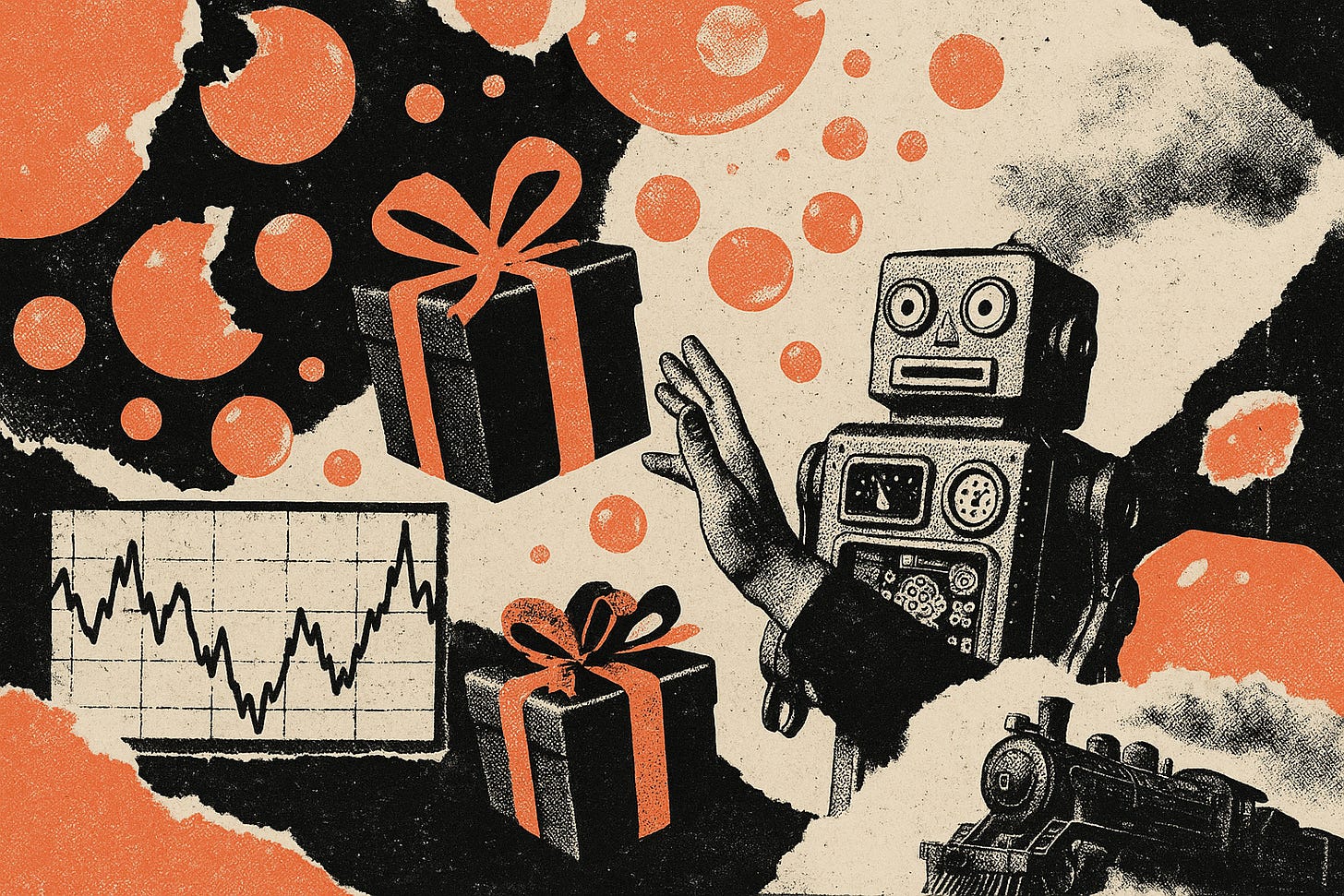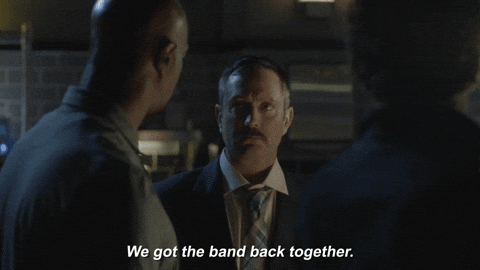In Defense of Bubbles
The wreckage is real. So are the gifts hiding underneath.
This week, we’re talking:
Every bubble leaves behind a gift — railroads, dot-com fiber, and now AI. The question is whether you’re betting on the froth or the foundation. 🫧
Microsoft’s Anthropic side piece — Claude sneaks into Office 365, and the OpenAI–Microsoft “partnership” looks more like a trial separation. 💔
Supreme Court greenlights profiling — a 6–3 ruling brings echoes of Korematsu and Brignoni-Ponce. 🚨
AI nostalgia is the past that never was — TikTok is full of fake ’90s kids with mixtapes and mall hangs. If you can manufacture the past, you can manipulate the present. 📼
Abortion access gets a shield, data brokers still have a sword — bare-bones pill labels can’t hide a digital footprint. 💊
Distribution is the final moat — in a market full of good products, Gong vs. Clari proves distribution wins. 🛠️
My Take:
Every bubble leaves behind a gift.
That's the paradox. Bubbles are wasteful, painful, even destructive. They burn through capital, torch reputations, and leave wreckage in their wake. But they also build the scaffolding for the future.
Take the railroads…
In the 1800s, investors poured money into laying track across the U.S. and Britain. The hype was about people: gleaming trains whisking passengers across vast distances. Capital flooded in, lines were built where they weren't needed, and many companies collapsed. Passenger traffic alone couldn't justify the frenzy.
But even after the bust, the tracks remained. They became our national commerce network. Railroads became the backbone of industrial shipping and long-haul freight, stitching together supply chains and markets at a continental scale.
The bubble burst, but the gift remained.
Or take the dot-com boom.
In the 90s, Nortel, Worldcom, and Global Crossing strung fiber faster than the world could possibly use it. They quickly collapsed under the weight of their own enthusiasm. But the infrastructure they left behind powered Amazon, Netflix, and the internet we know today.
The bubble burst, but the gift remained.
Which brings us to today's AI bubble.
Everyone's bolting "intelligence" onto everything. Valuations are zipping into the stratosphere. There's more cheap intelligence sloshing around than organizations can metabolize into actual business value.
If the pattern holds, the gift of this bubble won't be the parade of demos or the latest model. It will be the apps that sit atop this new infrastructure layer: software applications that turn LLM horsepower into business outcomes, the part that makes a thousand scattered tools play together.
This pattern is why we're betting on agentic orchestration at Symmetri. We just raised $6 million, came out from under the covers, and are ready to get moving.
At Krux, we built what became the brain of Salesforce Marketing Cloud, the early instance of today’s Customer Data Platform category. By today's standards, that was one tiny, adorable agent. If Krux was a soloist, Symmetri is the whole damn orchestra. And yes, we're bringing the band back together.
But here's what matters beyond any one company: the lesson is about how to read bubbles. They always look irrational in the moment, but if you're a founder or investor, the trick is to see past the froth and ask: what foundation is being laid that will endure?
The bubble will burst. The question is whether you've placed your bets on the gift it leaves behind.
My Stack:
Microsoft’s Anthropic Side Piece Looks More Like a Trial Separation 💔
Microsoft is bringing Anthropic’s Claude into Office 365 — Word, Excel, Outlook, PowerPoint. That’s a big deal. For years, OpenAI had the keys to the kingdom. Now Microsoft is shopping around. Insiders say Claude just performs better on bread-and-butter tasks like spreadsheets and slides. But the bigger story is what it signals: OpenAI building its own chips, clouds, and even a LinkedIn rival; Microsoft diversifying its bets. They call it a partnership. It looks a lot more like a breakup in slow motion.
Source: The Information
Supreme Court Greenlights Profiling 🚨
In a 6–3 ruling, the Supreme Court opened the door for “roving” immigration patrols in L.A. — stops based on race, language, or where you work. Immigration experts call it legalized profiling. We’ve been here before. In Korematsu (1944), the Court upheld Japanese internment, later admitting it fell into “the ugly abyss of racism.” In Brignoni-Ponce (1975), the Court said “Mexican appearance… standing alone does not justify” an immigration stop. Now, half a century later, the Court is backpedaling.
Source: The Guardian
AI Nostalgia: The Past That Never Was 📼
Nostalgia is a hell of a drug. And AI is no less addicting. Combine the two and you’ve got a recipe for disaster. TikTok and Instagram are filling up with eerily convincing AI videos of ’80s and ’90s kids roasting marshmallows, swapping mixtapes, hanging at the mall. To Gen Z, who never lived it, they might as well be real. It’s not quite harmles pining. Fake golden ages can be weaponized. To sell you things, or worse, to sell you politics. If you can manufacture the past, you can manipulate the present.
Source: NYTimes
Abortion access gets a shield. Data brokers still have a sword. 💊
California just passed one of the strongest protections yet for abortion pill access: providers can ship medication with “bare bones” labels that leave off patient and prescriber names. That matters, because most mail-order abortion pills nationwide are dispensed from California. The goal is obvious: make it harder for states with bans to build legal cases. But without real data privacy laws, the shield only goes so far. Search histories, text messages, payment records… Your digital footprint will out you long before the label does.
Source: NYTimes
Distribution Is the Final Moat 🛠️
Build it and they will come? Not anymore. “A superior distribution strategy can beat a comparable (or even slightly better) product. It happens all the time.” Gong vs. Clari is the classic case: “The products were similar, but Gong’s aggressive go-to-market execution and powerful brand made them the undisputed leader. They didn’t just outsell Clari; they defined the entire category and framed their competitor as a discount alternative.” That’s the lesson: in a market full of good products, distribution is the only moat left.
Source: The VC Corner







Thanks for mentioning Korematsu! Everyone should visit the exhibit, "Exclusion," at the Presidio Officer's Club. It's about the Japanese-American incarceration during WW2.
https://presidio.gov/special-exhibition-exclusion